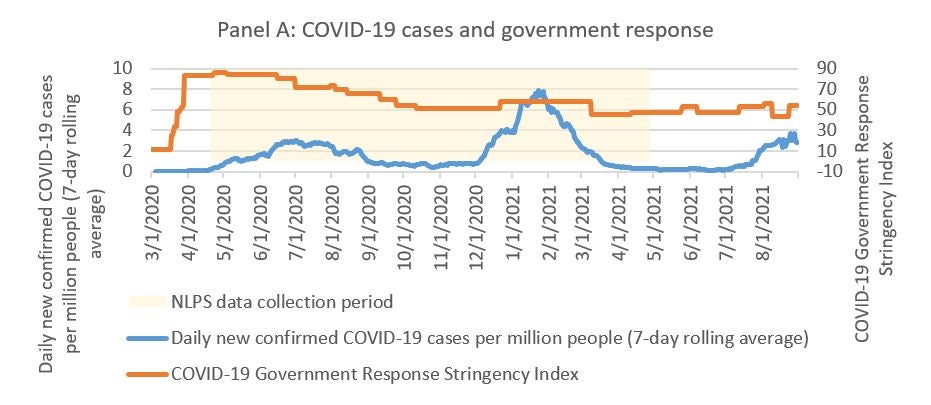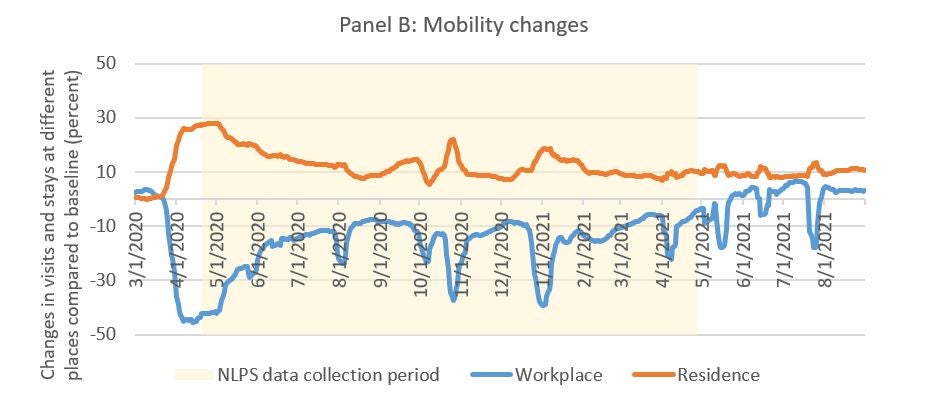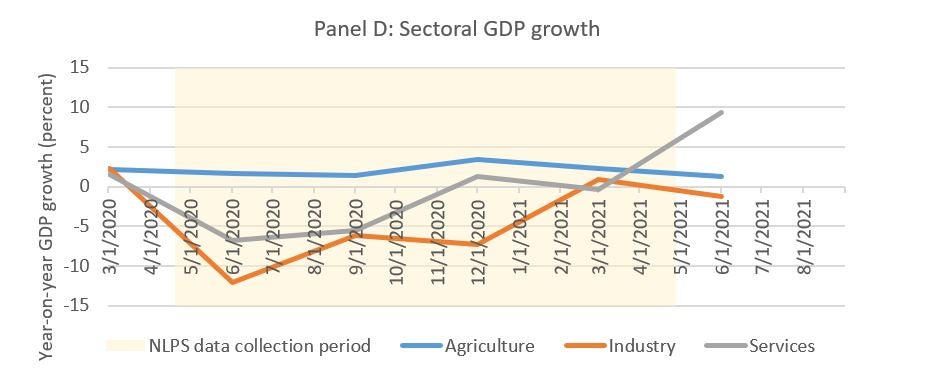 The COVID-19 crisis in Nigeria: what’s happening to welfare?
The COVID-19 crisis in Nigeria: what’s happening to welfare?
The health impacts of COVID-19 have not spared Nigeria. The country recorded its first case of COVID-19 on February 27, 2020, and has subsequently suffered three distinct waves of infection, peaking in June 2020, January 2021, and August 2021 (Panel A, Figure 1). Health and safety measures – including inter-state and international travel bans, restrictions on mass gatherings, and school closures – have waxed and waned with case numbers, as the federal government has sought to contain the spread of the virus.
Harsh economic impacts
Nevertheless, many of the primary effects of the COVID-19 crisis on Nigeria have been economic, rather than health related. The early part of the COVID-19 crisis ushered in Nigeria’s deepest recession since the 1980s, with services and industry hit especially hard (Panel D, Figure 1). This partly stemmed from lockdown measures restricting people’s ability to go to work (Panel B, Figure 1). On top of that, the price of oil – which represents more than 80 percent of Nigeria’s exports and more than 50 percent of government revenues – tumbled more than 60 percent between February and May 2020 (Panel C, Figure 1).
In the later stages of the COVID-19 crisis, even though economic activity began to recover, inflation started to accelerate, especially for food items that are crucial for consumption among the poor and vulnerable (Panel C, Figure 1). By disrupting markets, the crisis has exacerbated pre-existing structural distortions – including trade restrictions, such as the 2019 border closure – which were already driving up prices and eroding purchasing power, even before the pandemic struck.
Figure 1. The changing nature of the COVID-19 crisis in Nigeria




Note: NLPS = National Longitudinal Phone Survey. Real GDP deflated using the GDP deflator. Source: Nigerian National Bureau of Statistics (NBS) and World Bank estimates
Frontline data to inform policy
While health indicators and macroeconomic data are essential for addressing the fundamentals of the COVID-19 crisis, countervailing policies need detailed information on the mechanisms through which the pandemic affects human capital, livelihoods, and welfare. This is especially important in Nigeria because the pandemic threatens to compound the country’s high levels of poverty: even before COVID-19, around 4 in 10 Nigerians lived below the national poverty line, and multidimensional poverty was even more widespread.
In Nigeria, this kind of detailed analysis is made possible by high-frequency data collected during the pandemic through the Nigeria COVID-19 National Longitudinal Phone Survey (NLPS). This nationally-representative survey is distinctive in capturing key socioeconomic information from households for 12 consecutive rounds between April 2020 and April 2021: few other developing countries with which the World Bank has worked on phone surveys have such extensive data.
A new report – COVID-19 in Nigeria: Frontline Data and Pathways for Policy – uses the NLPS to examine how the COVID-19 crisis has been affecting the human capital, livelihoods, and welfare of Nigerian households. Another forthcoming blog uses the NLPS data to explore the crisis’ profound impacts on employment and education: households have been scrambling to boost their precarious incomes through additional work in small-scale non-farm enterprises, sometimes coming at the expense of education for young people. This blog considers the resulting welfare effects.
Weak social protection worsens crisis impacts
The lack of social protection in Nigeria exposes its population to large welfare losses. Before the pandemic struck, less than 2 percent of Nigerians lived in a household enrolled in the country’s flagship social protection program – the National Social Safety Net Project (NASSP) – and coverage of most other programs was even lower. Coverage of social protection programs remained low throughout the COVID-19 crisis. Between March 2020 and March 2021, just 4 percent of households had received support – in the form of cash – from the federal, state, or local government (Figure 2). This is significantly below what would be needed to counteract the widening and deepening of poverty brought about by the crisis.
Figure 2. Social protection coverage has remained low throughout the COVID-19 crisis

Note: Coverage shown for social protection from the government, state, or local government, not from other sources, such as non-governmental organizations or religious bodies. Source: NLPS and World Bank estimates.
Risky coping strategies threaten human capital
Given this lack of social assistance, Nigerian households have been adopting negative coping strategies in response to the shocks that have accompanied the COVID-19 crisis. Indeed, households directly reported feeling the acceleration in prices observed in the macroeconomic data: around 82 percent of households reported that the price of major food items had increased between July 2020 and December 2020. The most widespread coping strategy was reducing food consumption: more than two-thirds of shock-hit households reduced their food consumption between April/May 2020 and July 2020. This was followed by additional borrowing and drawing down savings, which could place households on weaker financial footing.
Unsurprisingly, food insecurity increased when the COVID-19 crisis hit. In April/May 2020, at least one adult had skipped a meal (in the previous 30 days) in almost three-quarters of Nigerian households (Figure 3). This share had dropped to about 56 percent by November 2020 but was still significantly higher than what was observed prior to the pandemic.
Figure 3. Food insecurity increased sharply at the start of COVID-19 crisis
Note: Chart shows the share of households in which each measure of food insecurity was reported in the 30 days prior to the interview. Source: NLPS and World Bank estimates.
Negative coping strategies threaten welfare today and have implications for the future. Food insecurity may have long-run consequences for human capital, as child stunting in Nigeria was widespread even before the pandemic, and malnutrition can weaken children’s capacity for learning. Alongside other immediate priorities for Nigeria, such as rolling out vaccines and recouping learning losses, scaling up social protection – including using innovative techniques to reach the poor – remains crucial for alleviating the effects of the COVID-19 crisis in the short, medium, and long run.




Join the Conversation